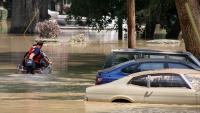Climate and Health

In the last 50 years, scientists have observed an increase in global temperature at a rate faster than ever before recorded. It has become clear that a casualty of climate change is population health as urban populations around the world grapple with extreme heat and infectious disease; vulnerabile populations contend with weakened sanitation systems and lack of access to safe shelter following historic storms; and food systems struggle as crops wither or lose nutrient value from depleted soil.
With broad and deep expertise across a range of climate and health areas, complemented by the expertise of faculty University-wide who engage with Columbia University's recently launched Climate School, our faculty are uniquely well-positioned to build interdisciplinary teams that unlock complex new understandings in this important field. Ongoing faculty work includes:
• Using an array of modeling techniques, Jeffrey Shaman, professor of Environmental Health Sciences, forecasts West Nile Virus, influenza, and other infectious disease to help predict health risks.
• Matthew Neidell, professor of Health Policy and Management, studies the impact of temperature and pollution on various health and human capital outcomes.
• Frederica Perera, professor of Environmental Health Sciences and former director of the Columbia Center for Children’s Environmental Health, works to identify and prevent developmental delays associated with prenatal exposure to air pollutants that worsen health and contribute to global warming.
• Lewis Ziska, associate professor of Environmental Health Sciences, is a Plant Physiologist formerly with the USDA’s Agricultural Research Service who has published over 150 peer-reviewed research articles on how climate change and rising carbon dioxide levels will impact crop genetics, nutrition, and food safety
Climate and Health Program
Faculty and students in our Climate and Health Program, the first of its kind in the United States, produce key research on a wide range of areas impacted by climate, including food security, pollution, heat-related morbidity and mortality, forced migration, infectious disease, children’s health, epigenetics, metabolomics, health justice, and neurodevelopment. Our faculty have been studying these and other environmental health risks factors for years, identifying today’s most pressing issues, forecasting future challenges, and developing analytical tools to improve long-term health resiliency to climate extremes.
Climate and Health Education
Columbia Mailman continues to lead in educating the next generation of Climate and Health leaders. Our Climate and Health program currently includes 11 doctoral students (two more completed their PhD degrees last summer) and the School has 28 MPH students from across academic departments at Columbia Mailman enrolled in our climate health certificate program. We also remain at the forefront of the global effort to build a health professions workforce with understanding of the health impacts of climate change. To date, the Global Consortium on Climate and Health Education (GCCHE), launched by Columbia Mailman in 2017, includes 213 health professions school member institutions in over 30 countries, on 6 continents; GCCHE also includes 3 Association Members, most recently the Association of Schools of Public Health in the European Region.